-

新人教版高中英语必修3Unit 4 Space Exploration-Listening&Speaking&Talking教学设计二
The themes of this part are “Talk about how to become an astronaut” and “Talk about life in space”. As Neil Armstrong said “Mystery creates wonder and wonder is the basis of man’s desire to understand. Space is difficult for human to reach, therefore, humans are full of wonders about it. However, if wanting to achieve the dream of reaching the Moon, some of our human should work hard to be an astronaut at first. Part A(Talk about how to become an astronaut) is a radio interview in a radio studio, where the host asked the Chinese astronauts about his story how to become an astronaut. Yang Liwei told his dreamed to be an astronaut since childhood. Then he worked hard to get into college at 22. The next 10 years, he gradually became an experienced pilot. At the same time, to be an astronaut, he had to study hard English, science and astronomy and trained hard to keep in good physical and mental health and to practise using space equipment. Part B (Talk about life in space) is also an interview with the astronaut Brown, who is back on the earth. The host Max asked about his space life, such as his emotion about going back the earth, the eating, shower, brushing, hobbies and his work. Part A and Part B are interviews. So expressing curiosity about the guests’ past life is a communicative skill, which students should be guided to learn.1. Students can get detailed information about how Yang Liwei became an astronaut and Max’s space life.2. Students learn to proper listening strategy to get detailed information---listening for numbers and taking notes.3. Students can learn related sentences or phrases to express their curiosity like “ I wish to know...” “I’d love to know...”4. Students can learn more about the space and astronauts, even be interested in working hard to be an astronaut

新人教版高中英语必修3Unit 4 Space Exploration-Reading and Thinking教学设计二
The theme of this unit focuses on “space exploration.” Students will learn about the training and experience needed to become an astronaut. The text is mainly about the development of space exploration. On the one hand, the text helps students to have a good understanding about the great feats humans have achieved, on the other hand, they will further understand the contributions that we Chinese have achieved, and feel confident and proud about our homeland and strengthen their love for our country. The teacher should instruct students to aim high and study harder to make great progress in the space career if possible.1. Read about the development and value of space exploration.2. Explore the mysteries of the universe and the achievements in space exploration.3. Skillfully use the vocabulary of this text to cultivate self-study ability 4. Develop cooperative learning ability through discussion.1. Enable the Ss to talk about the development and value of space exploration.2. Guide the Ss to summarize the main idea of each paragraph as well as the main idea of the text.3. Help Ss comprehend the main reasons for space exploration. Multi-media, textbook, notebooks.Step 1: Warming up and predictionLook at the title and the pictures of the text and predict what the text will be about?2. What are the main reasons for space exploration?

新人教版高中英语必修3Unit 4 Space Exploration-Reading for Writing教学设计二
⑦在我看来, 探索太空是值得的。As far as I am concerned, it is worthwhile to explore the space.Step 10 Writing---draftRecently, students in our class have had heated a discussion on whether space is worth exploring. Students hold different ideas about it.30% of us think space exploration is not worthwhile. They think space is too far away from us and our daily life and is a waste of money. And the money spent on space exploration can be used to solve the earth’s problems such as starvation and pollution.On the other hand,70% think space is worth exploring because we have benefited a lot from it,such as using satellites for communication and weather forecast. What’s more,with further space research,we may solve the population problem by moving to other planets one day. Also,space research will enable us to find new sources to solve the problem of energy shortages on the earth.As far as I am concerned, it is worthwhile to explore the space. Not only can it promote the development of society but also enrich our life. Step 11 Pair workExchange drafts with a partner. Use this checklist to help your partner revise his/her draft.1.Does the writer explain why he/she changed/wanted to change?2.Does the writer tell how the changes have improved or will improve his/her life?3.Is the text well-organised?4.Does the writer use words and expressions to show similarities and differences?5.Are there any grammar or spelling errors?6.Does the writer use correct punctuation?

新人教版高中英语必修3Unit 5 The value of money-Reading and Thinking教学设计二
? Could you offer me some kind of work here?? I don’t want your charity, I just want an honest job.? Careless: I landed in Britain by accident.Step 7:Consolidation.? Find Henry? Roderick and Oliver were I .making a bet when they saw Henry, a poor young man. ? Know Henry? About a month ago, Henry was sailing and later he found himself carried out to sea by a strong wind. Fortunately, he 2.was spotted by a ship. And it was the ship that brought him to 3.England? Offer money to Henry ? Oliver and Roderick gave Henry a letter and told him that there was money in it. They 4.persuaded him to accept it, and made him 5.promise that it wouldn't be opened until 2 o'clock.Step 8:Language pointsa large amount of: a large quantity of; a great deal ofe.g. They bought a large amount of furniture before they moved their new house.make a bet: make an arrangement to risk money, etc. on an event of which the result is doubtful.e.g. We made a bet on the result of the match.permit sb to do something: allow somebody to do somethinge.g. My mother doesn’t permit me to ride in the street after it rained.by accident: as a result of chancee.g. I only found it by accident.stare at: look at somebody or something with the eyes wide open in a fixed gaze( in astonishment, wonder, fear, etc)to be honest: to tell you the truth; to be franke.g. To be honest, I don’t think we have a chance of winning.Step7 Homework:What do you think will happen to Henry? Will the bank-note help him or get him into trouble?

新人教版高中英语必修3Unit 5 The Value of Money-Reading for Writing教学设计二
2. 您能看到, 我头发太长了。You can see that my hair is much too long.3. 无论什么时候, 只要您想回来就回来。Please come back whenever you want.4. 您仅有很少的头发要理! You only have too little hair to cut !5. 为您服务是我的荣幸!It is my honour to serve you!Step 9 Writing(Henry is walking down the street when he sees a sign for a place that cuts hair. He decides to have it cut. )H=Henry B=BarberH: Good afternoon, I’d like to have my hair cut, if I may. (The barber looks at Henry’s hair and continues cutting another man’s hair. ) Er, I’d really like a haircut. As you can see it’s much too long. B: (in a rude manner) Yes, I can see that. Indeed, I can. H: Fine, well, I’ll have a seat then. (He sits in one of the barber’s chairs. The barber turns to look at Henry. )B: It’s quite expensive here, you know! Are you sure you can afford it?H: Yes. I think so. (After his hair is cut, the barber tells Henry how much he must pay. Henry shows the barber the bank note. )B: Why Mr. . . (looks shocked)H: Adams. Henry Adams. I’m sorry. I don’t have any change. B: Please don’t worry! (wearing a big smile) Nothing to worry about! Nothing at all! Please come back whenever you want, even if you only have too little hair to cut! It will be my honour to serve you!Step 10 Pair workExchange drafts with a partner. Use this checklist to help your partner revise his/her draft.1. Are all the elements of a play included and in good order ?2. Do the character use suitable language ?3. Are the stage directions clear and useful ?4. Is the plot clear and exciting enough ?
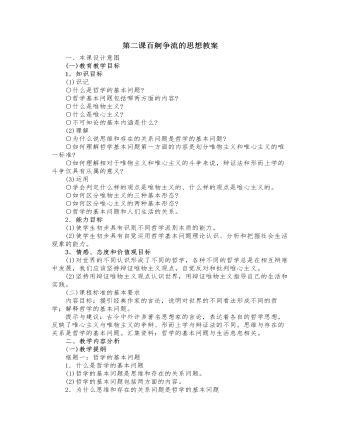
人教版高中政治必修4第二课百舸争流的思想教案
不可知论是否认人们认识世界或彻底改造世界的可能性的哲学学说。此概念首先由英国的赫胥黎(1825—1895)于1869年提出,不可知论的思想在古代就已产生,欧洲近代的主要代表是休谟和康德。其本质是把人的感觉看作是主观和客观之间的屏障而不是桥梁,不承认在感觉之外有确实可靠的客观外部世界的存在,不懂得认识过程中本质与现象、有限与无限的辩证关系。对不可知论最有力的驳斥是实践。有时不可知论一词也用以专指针对宗教教义而提出的一种学说,认为上帝是否存在、灵魂是否不朽是不可知的。2.二元论二元论是认为世界有两个本原的哲学学说,与一元论相对立,它把物质和意识绝对对立起来,认为物质和意识是两个各自独立、相互平行发展着的实体,谁也不产生谁,谁也不决定谁,都是世界的本原。它的观点是错误的:它肯定精神不依赖于物质而独立存在,这本身就是唯心主义的观点;它虽然承认物质是独立的本原,但在说明物质和精神的关系时,又把精神说成是唯一具有能动性的力量,必然倒向唯心主义。主要代表人物是法国的笛卡儿和德国的康德。
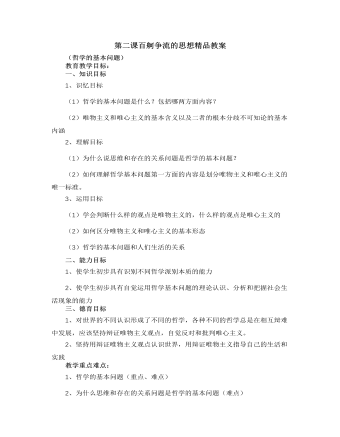
人教版高中政治必修4第二课百舸争流的思想精品教案
7、人总是按照自己对周围世界和人生的理解做事。有人认为命由天定,因而身处困境只是消极等待、逆来顺受;有人认为人定胜天,因而在困难面前积极奋争、不屈不挠。以上材料说明( )A哲学源于人们对实践的追问和对世界的思考B世界观决定方法论,方法论体现着世界观C哲学不等于自发的世界观D哲学是关于世界观的学说8、世界观和方法论的关系是()A世界观和方法论相互决定B方法论决定世界观,世界观体现方法论 C世界观决定方法论,方法论体现世界观 D世界观和方法论相互影响,相互决定9、下列关于哲学、世界观、具体知识之间联系的正确说法是()A哲学是关于世界观和具体知识的统一B哲学就是科学的世界观和具体知识C哲学是关于世界观的学说,是具体知识的概括和总结D哲学决定世界观,世界观决定具体知识10、下列对哲学的认识,不正确的是()A哲学是关于世界观的学说B哲学是世界观和方法论的统一C哲学是理论化、系统化、科学化的世界观D哲学是对具体知识的概括和总结
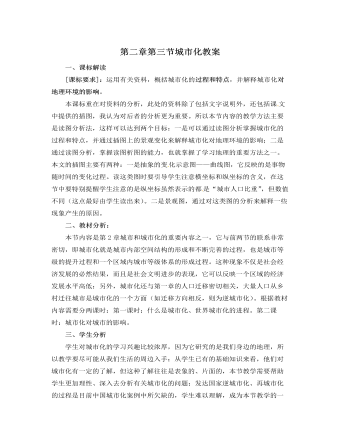
人教版新课标高中地理必修2第二章第三节城市化教案
[补充]:郑州是特大城市,我们对灯火通明的夜晚都有深刻的体会,我们都体会过光给他们带来的好处,而对过多过亮的光带来的危害则很少认真地思考过,且光污染给都市人们和其他生物和环境带来的不利影响也越来越大,所以,我在这儿给同学们补充光污染,目的是提醒他们要增强环保意识,要理解城市在建设过程中要减少城市各类活动对环境的污染;另外,随着城市的不断发展,还可能会产生新 的污染物。还培养了学生用发展的眼光来看世界。[思考]:如何降低城市化对地理环境产生的影响?[答]:发展生态城市,使人工环境和自然环境和谐统一起来。一方面在城市建设中,要发展低污染的节能建筑和绿色交通,减少城市各类活动对环境的污染;另一方面使城市景观尽可能地与山、河、湖、海、植被等自然景观保持协调,建立一种良性循环。
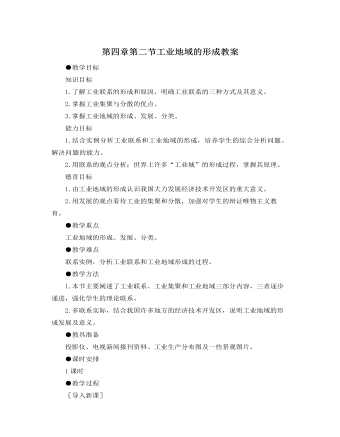
人教版新课标高中地理必修2第四章第二节工业地域的形成教案
在经济水平较高、工业地域规模较大的地区,其发展潜力就远不一样,如钢铁工业。钢铁工业的生产过程比较复杂(如课本图5.31),需要有相互接近的工厂,不仅包括从事钢铁生产各道工序的工厂,如烧结厂、焦化厂、炼铁厂、炼钢厂、轧钢厂,还包括与钢铁生产有联系的工厂,如氧气厂、机修厂、发电厂、水泥厂等,总共可达20~30个工厂。这些工厂集 聚,设备大,管线长,占地多。因此,这样形成的工业地域(钢铁工业区)面积广,发育程度高,发展潜力大。这类工业地域 再加上为方便众多工人生活所配置的服务业和其他工业,在发展过程中,往往由于工业地域的扩展而形成工业城市。例如,我国的鞍山(“钢都”)、攀枝花、马鞍山、包头(“草原钢城”)等钢铁工业城市的形成。除此之外,石油化工区、机械制造工业区等属于发育程度高的工业地域,也往往扩展而形成工业城市。例如,我国的石油城大庆、克拉玛依,汽车城十堰等。
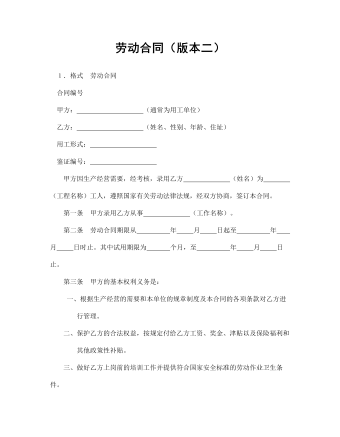
劳动合同(版本二)
甲方因生产经营需要,经考核,录用乙方 (姓名)为 (工程名称)工人,遵照国家有关劳动法律法规,经双方协商,签订本合同。 第一条 甲方录用乙方从事 (工作名称)。 第二条 劳动合同期限从 年 月 日起至 年 月 日时止。其中试用期限为 个月,至 年 月 日止。
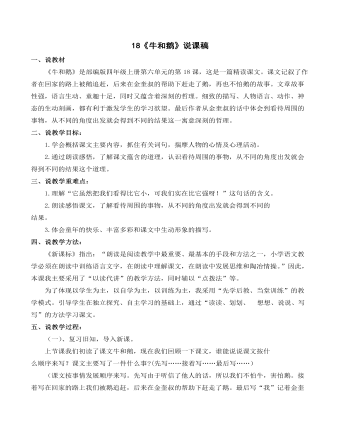
《牛和鹅》说课稿
(我们马上都不说话了,贴着墙壁,悄悄地走过去。我吓得脚也软了,更跑不快。在忙乱中,我的书包掉了,鞋子也弄脱了。)
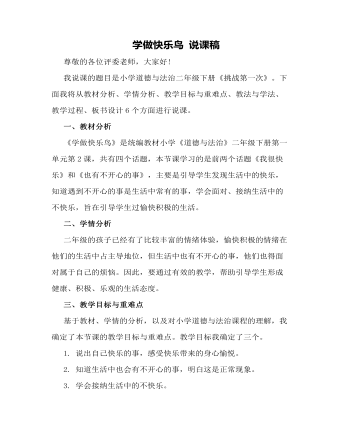
学做快乐鸟 说课稿
尊敬的各位评委老师,大家好!我说课的题目是小学道德与法治二年级下册《挑战第一次》。下面我将从教材分析、学情分析、教学目标与重难点、教法与学法、教学过程、板书设计6个方面进行说课。一、教材分析《学做快乐鸟》是统编教材小学《道德与法治》二年级下册第一单元第2课,共有四个话题,本节课学习的是前两个话题《我很快乐》和《也有不开心的事》,主要是引导学生发现生活中的快乐,知道遇到不开心的事是生活中常有的事,学会面对、接纳生活中的不快乐,旨在引导学生过愉快积极的生活。二、学情分析二年级的孩子已经有了比较丰富的情绪体验,愉快积极的情绪在他们的生活中占主导地位,但生活中也有不开心的事,他们也得面对属于自己的烦恼。因此,要通过有效的教学,帮助引导学生形成健康、积极、乐观的生活态度。三、教学目标与重难点基于教材、学情的分析,以及对小学道德与法治课程的理解,我确定了本节课的教学目标与重难点。教学目标我确定了三个。1. 说出自己快乐的事,感受快乐带来的身心愉悦。2. 知道生活中也会有不开心的事,明白这是正常现象。3. 学会接纳生活中的不快乐。教学重点是:引导学生发现生活中的快乐,知道遇到不开心的事也是正常现象。

《小放驴》教案
一、聆听《小放驴》 (1)导入 师:让我们来听听河北民间乐曲,看看河北的音乐给我们什么感受? (2)初听乐曲 师:歌曲给你什么感觉?有什么特点? (3)理解河北吹歌 师:河北吹歌——流行于河北民间的吹打音乐。河北吹歌以管子、唢呐作为主奏乐器,吹奏的大多是民歌和戏曲唱腔,因而得“吹歌”之名。(4)复听乐曲 师:再来听听歌曲,说说唢呐和管子的音色分别是怎样的?(5)演唱主题音乐 (6)再听乐曲 师:让我们再来听听音乐,说说音乐给你的印象是怎样的?二、组织下课 小结:你还知道哪些关于河北的音乐?
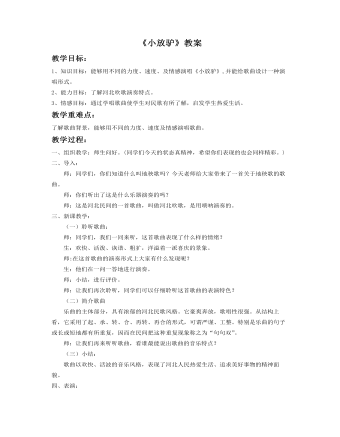
《小放驴》教案
教学过程:一、组织教学:师生问好。(同学们今天的状态真精神,希望你们表现的也会同样精彩。)二、导入:师:同学们,你们知道什么叫地秧歌吗?今天老师给大家带来了一首关于地秧歌的歌曲。师:你们听出了这是什么乐器演奏的吗? 师:这是河北民间的一首歌曲,叫做河北吹歌,是用唢呐演奏的。 三、新课教学: (一)聆听歌曲: 师:同学们,我们一同来听,这首歌曲表现了什么样的情绪? 生:欢快、活泼、诙谐、粗犷,洋溢着一派喜庆的景象。师:在这首歌曲的演奏形式上大家有什么发现呢?生:他们在一问一答地进行演奏。 师:小结,进行评价。 师:让我们再次聆听,同学们可以仔细聆听这首歌曲的表演特色?
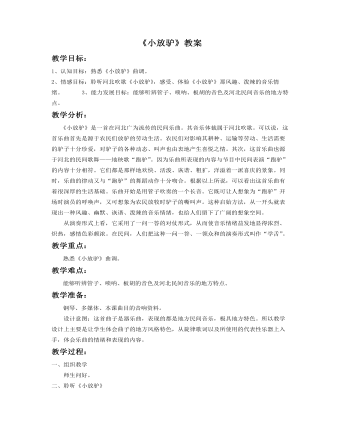
《小放驴》教案
《小放驴》是一首在河北广为流传的民间乐曲。其音乐体裁属于河北吹歌。可以说,这首乐曲首先是源于农民们放驴的劳动生活。农民们对影响其耕种、运输等劳动、生活需要的驴子十分珍爱,对驴子的各种动态、叫声也由衷地产生喜悦之情。其次,这首乐曲也源于河北的民间歌舞——地秧歌“跑驴”。因为乐曲所表现的内容与节目中民间表演“跑驴”的内容十分相符。它们都是那样地欢快、活泼、诙谐、粗犷,洋溢着一派喜庆的景象。同时,乐曲的律动又与“跑驴”的舞蹈动作十分吻合。根据以上所说,可以看出这首乐曲有着很深厚的生活基础。乐曲开始是用管子吹奏的一个长音。它既可让人想象为“跑驴”开场时演员的呼唤声,又可想象为农民放牧时驴子的嘶叫声。这种启始方法,从一开头就表现出一种风趣、幽默、诙谐、泼辣的音乐情绪,也给人们留下了广阔的想象空间。 从演奏形式上看,它采用了一问一答的对仗形式,从而使音乐情绪益发地显得浓烈、炽热,感情色彩颇浓。在民间,人们把这种一问一答、一领众和的演奏形式叫作“学舌”。
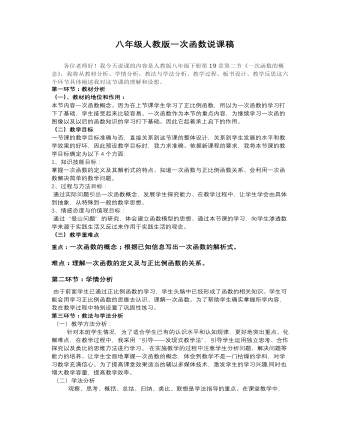
八年级人教版一次函数说课稿
1、知识技能目标:掌握一次函数的定义及其解析式的特点、知道一次函数与正比例函数关系、会利用一次函数解决简单的数学问题。2、过程与方法目标: 通过实际问题引出一次函数概念,发展学生探究能力、在教学过程中,让学生学会由具体到抽象,从特殊到一般的数学思想。 3、情感态度与价值观目标: 通过“登山问题”的研究,体会建立函数模型的思想、通过本节课的学习,向学生渗透数学来源于实践生活又反过来作用于实践生活的观念。
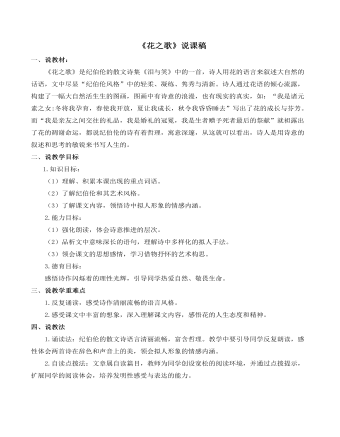
《花之歌》说课稿
1.知识目标:? (1)理解、积累本课出现的重点词语。?????(2)了解纪伯伦和其艺术风格。????? (3)了解课文内容,领悟诗中拟人形象的情感内涵。????2.能力目标:????? (1)强化朗读,体会诗意推进的层次。????? (2)品析文中意味深长的语句,理解诗中多样化的拟人手法。?????(3)领会课文的思想感情,学习借物抒怀的艺术构思。3.德育目标:?????? 感悟诗作闪烁着的理性光辉,引导同学热爱自然、敬畏生命。??一、说教学重难点?1.反复诵读,感受诗作清丽流畅的语言风格。????2.感受课文中丰富的想象,深入理解课文内容,感悟花的人生态度和精神。四、说教法1.诵读法:纪伯伦的散文诗语言清丽流畅,富含哲理。教学中要引导同学反复朗读,感性体会两首诗在辞色和声音上的美,领会拟人形象的情感内涵。??? 2.自读点拨法:文章属自读篇目,教师为同学创设宽松的阅读环境,并通过点拨提示,扩展同学的阅读体会,培养发明性感受与表达的能力。
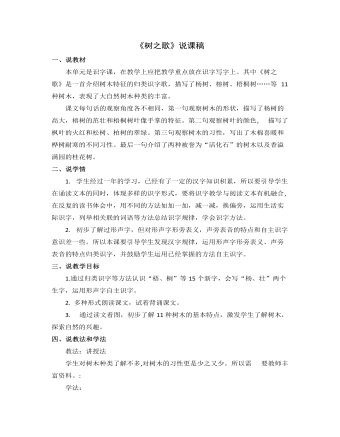
《树之歌》说课稿
普通的树木在气候不适宜的时候(譬如寒冷,干燥),因为叶子面积较大,表面没有蜡质的薄膜,而导致水分散失快,不易生存,所以在秋冬季会变黄,落叶。
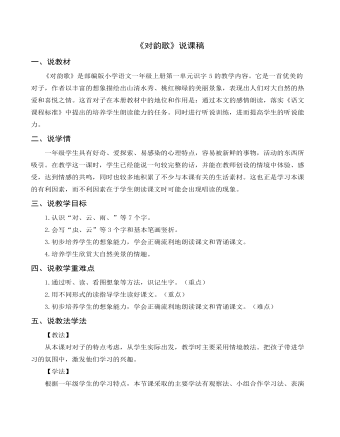
《对韵歌》说课稿
11.课件出示风字。(出示:风)。认读生字---风。风是一个后鼻韵母,学生容易读错,重点指导读准字音。师领读三遍。开火车读,通过语境组词,让孩子加深印象。
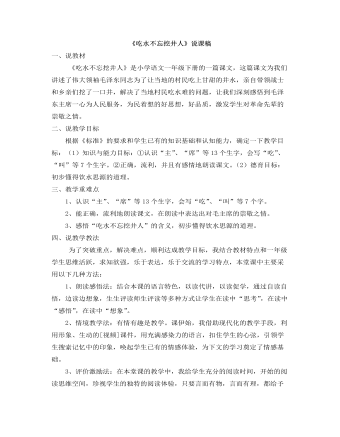
部编人教版一年级下册《吃水不忘挖井人》说课稿
一、说教材《吃水不忘挖井人》是小学语文一年级下册的一篇课文,这篇课文为我们讲述了伟大领袖毛泽东同志为了让当地的村民吃上甘甜的井水,亲自带领战士和乡亲们挖了一口井,解决了当地村民吃水难的问题,让我们深刻感悟到毛泽东主席一心为人民服务,为民着想的好思想,好品质,激发学生对革命先辈的崇敬之情。二、说教学目标根据《标准》的要求和学生已有的知识基础和认知能力,确定一下教学目标:(1)知识与能力目标:①认识“主”、“席”等13个生字,会写“吃”、“叫”等7个生字。②正确,流利,并且有感情地朗读课文。(2)德育目标:初步懂得饮水思源的道理。